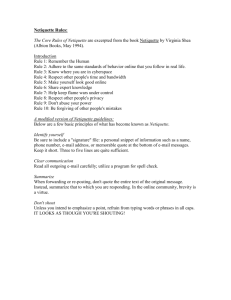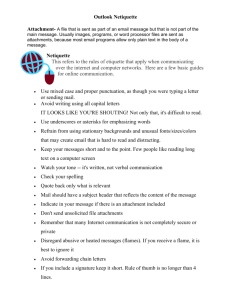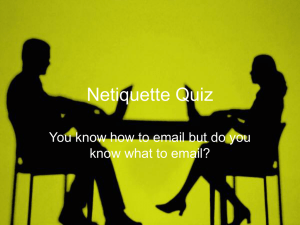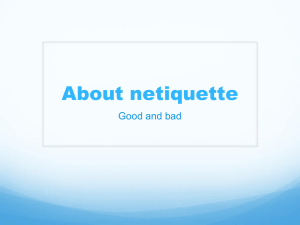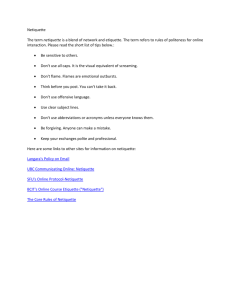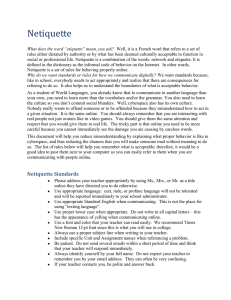Speech Issues and Ethics In Computing 1
advertisement
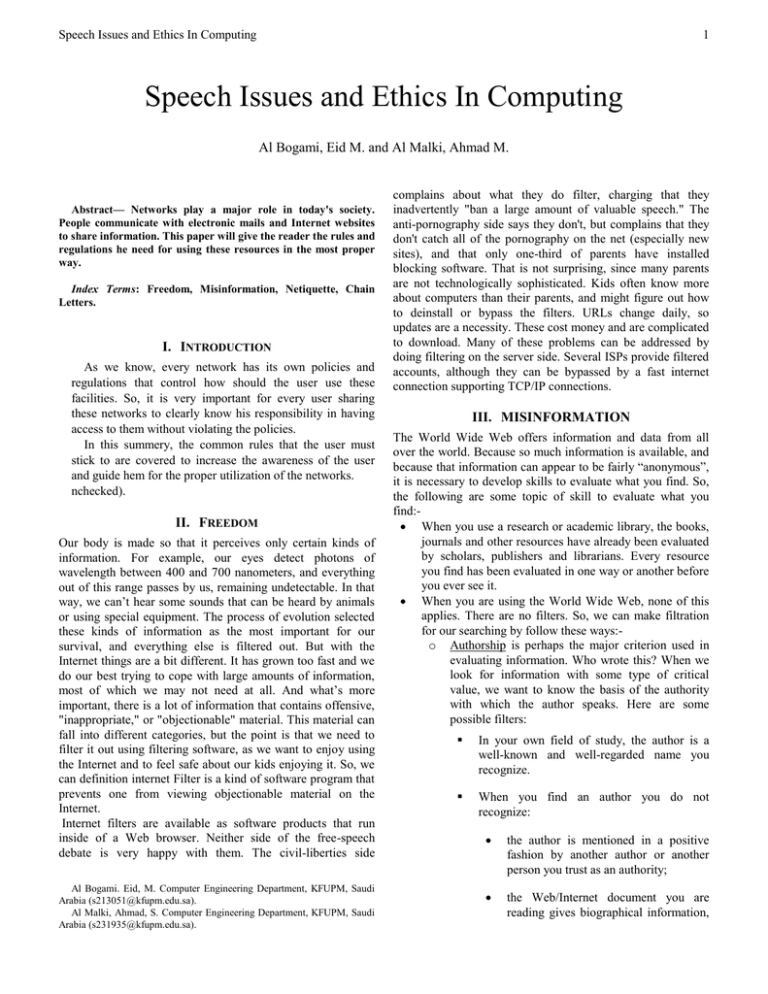
Speech Issues and Ethics In Computing 1 Speech Issues and Ethics In Computing Al Bogami, Eid M. and Al Malki, Ahmad M. Abstract— Networks play a major role in today's society. People communicate with electronic mails and Internet websites to share information. This paper will give the reader the rules and regulations he need for using these resources in the most proper way. Index Terms: Freedom, Misinformation, Netiquette, Chain Letters. I. INTRODUCTION As we know, every network has its own policies and regulations that control how should the user use these facilities. So, it is very important for every user sharing these networks to clearly know his responsibility in having access to them without violating the policies. In this summery, the common rules that the user must stick to are covered to increase the awareness of the user and guide hem for the proper utilization of the networks. nchecked). II. FREEDOM Our body is made so that it perceives only certain kinds of information. For example, our eyes detect photons of wavelength between 400 and 700 nanometers, and everything out of this range passes by us, remaining undetectable. In that way, we can’t hear some sounds that can be heard by animals or using special equipment. The process of evolution selected these kinds of information as the most important for our survival, and everything else is filtered out. But with the Internet things are a bit different. It has grown too fast and we do our best trying to cope with large amounts of information, most of which we may not need at all. And what’s more important, there is a lot of information that contains offensive, "inappropriate," or "objectionable" material. This material can fall into different categories, but the point is that we need to filter it out using filtering software, as we want to enjoy using the Internet and to feel safe about our kids enjoying it. So, we can definition internet Filter is a kind of software program that prevents one from viewing objectionable material on the Internet. Internet filters are available as software products that run inside of a Web browser. Neither side of the free-speech debate is very happy with them. The civil-liberties side Al Bogami. Eid, M. Computer Engineering Department, KFUPM, Saudi Arabia (s213051@kfupm.edu.sa). Al Malki, Ahmad, S. Computer Engineering Department, KFUPM, Saudi Arabia (s231935@kfupm.edu.sa). complains about what they do filter, charging that they inadvertently "ban a large amount of valuable speech." The anti-pornography side says they don't, but complains that they don't catch all of the pornography on the net (especially new sites), and that only one-third of parents have installed blocking software. That is not surprising, since many parents are not technologically sophisticated. Kids often know more about computers than their parents, and might figure out how to deinstall or bypass the filters. URLs change daily, so updates are a necessity. These cost money and are complicated to download. Many of these problems can be addressed by doing filtering on the server side. Several ISPs provide filtered accounts, although they can be bypassed by a fast internet connection supporting TCP/IP connections. III. MISINFORMATION The World Wide Web offers information and data from all over the world. Because so much information is available, and because that information can appear to be fairly “anonymous”, it is necessary to develop skills to evaluate what you find. So, the following are some topic of skill to evaluate what you find: When you use a research or academic library, the books, journals and other resources have already been evaluated by scholars, publishers and librarians. Every resource you find has been evaluated in one way or another before you ever see it. When you are using the World Wide Web, none of this applies. There are no filters. So, we can make filtration for our searching by follow these ways:o Authorship is perhaps the major criterion used in evaluating information. Who wrote this? When we look for information with some type of critical value, we want to know the basis of the authority with which the author speaks. Here are some possible filters: In your own field of study, the author is a well-known and well-regarded name you recognize. When you find an author you do not recognize: the author is mentioned in a positive fashion by another author or another person you trust as an authority; the Web/Internet document you are reading gives biographical information, Speech Issues and Ethics In Computing 2 including the author's position, institutional affiliation and address; o Publishing body also helps evaluate any kind of document you may be reading. In the print universe, this generally means that the author's manuscript has undergone screening in order to verify that it meets the standards or aims of the organization that serves as publisher. This may include peer review. On the Internet, ask the following questions to assess the role and authority of the "publisher", which in this case means the server (computer) where the document lives: o IV. NETIQUETTE if none of the above, there is an address and telephone number as well as an email address for the author in order to request further information on his or her work and professional background. An e- mail address alone gives you no more information than you already have. Is the name of any organization given on the document you are reading? Are there headers, footers, or a distinctive watermark that show the document to be part of an official academic or scholarly Web site? Can you contact the site Webmaster from this document? Is this organization recognized in the field in which you are studying? Is this organization suitable to address the topic at hand? Referral to sources refers to the context in which the author situates his or her work. This reveals what the author knows about his or her discipline and its practices. This allows you to evaluate the author's scholarship or knowledge of trends in the area under discussion. The following criteria serve as a filter for all formats of information: The document includes a bibliography. The author alludes to or displays knowledge of related sources, with proper attribution. The author displays knowledge of theories, schools of thought, or techniques usually considered appropriate in the treatment of his or her subject. If the author is using a new theory or technique as a basis for research, he or she discusses the value and/or limitations of this new approach. If the author's treatment of the subject is controversial, he or she knows and acknowledges this. Netiquette is a set of rules that describe the proper behaving on the internet. Knowing the basics of Netiquette will help you to communicate effectively online. It provides guidelines for understanding and interpreting online communication and for avoiding unwanted online behavior. Some Rules and regulations of Netiquette: Use normal upper and lower case letters. Avoid using all capital letters in a message. Don't assume that your intentions will be understood and remember also that there is no body language or facial expression to indicate your intentions. Remember that e-mail is not necessarily private. Your message can be forwarded to many people without your knowledge. In addition, most e-mail servers have programs that archive the e-mail messages that they handle. Before sending a message, read it over, make sure it's what you want to say, and double check the recipient(s). Always identify yourself and keep messages as brief and to the point as possible. Make sure that you don't send large files as attachments for any one before his acknowledgment. This will over load his email inbox and any other message may not be able to accept. Try not to download large files (larger than 1 megabyte) during the prime time of the work. This will affect the performance of the network. Users are responsible for checking copyright or licensing agreements for the files or the programs that they download. Adhere to the same standards of behavior online that you follow in the real life. Respect the time and the bandwidth of the others. Make your self look good online. Respect the privacy of the other people. Do not abuse your power. Be forgiving of other people's mistakes. By following these netiquette guidelines, users will help to make the Internet a civil place to communicate and share ideas. V. CHAIN LETTERS Speech Issues and Ethics In Computing Chain letters are letters which promise a big income or gain by only applying a small effort. The simplest form of a chain letter contains a list of ten people for example. You are supposed to send some amount of money (10 Dollars for example) to the top person on the list. Then you remove the top person on the list, sliding the second person into the top position, add yourself in the bottom position, make copies of the letter as much as you can, and mail them to your friends or any email you know. The promise is that you will eventually receive 10 Dollars for every user you send the message to. But unfortunately, if you participate you will find that you have paid more than what you gained. For this reason, the chain letters are illegal and it is just a way if cheating the people. It also wastes the bandwidth of the network on something unreliable and unprofitable. Chain letters do not have the name or the address of the original sender. So, you can not chick its authentication. These letters can be identified by three recognizable parts: 1. A hook. They try to catch your interest and force you to read their message. One of these techniques is to start their messages by attractive words such as "Make Money Fast" and "Get Rich". 2. A threat. They use threat some times to force you to respond. In some cases, they worn you about the terrible that may happen if you don't maintain the chain. 3. A request. Some of these chain letters ask you to send ten dollars for example to the top ten people and send this letter as many as you can. VI. CONCLUSION In conclusion, every user should understand his rights and duties before starting browsing the internet. He has to understand that these regulations are not against his freedom and know that their goals are to protect him and help hem to enjoy the internet in a reliable and good environment. He should also try to spread these kinds of papers to increase the awareness among whole users. VII. REFERENCES [1] [2] [3] [4] Chain Letters http://www.usps.com/postalinspectors/fraud/chainlet.htm Internet Behavior and Ethics: Netiquette http://www.abacon.com/compsite/conversation/netiquette.html WHAT EXACTLY IS "NETIQUETTE"? http://www.onlinenetiquette.com/netiquette_101.html How do you recognize a chain letter? http://www.andypryke.com/university/viruses/chain_letter_recognition.html [5] Internet Filtering basics http://www.softforyou.com/articles_tutorials/internet_filtering_basics.ht ml 3 [6] [7] [8] Free Speech and the Internet http://people.engr.ncsu.edu/efg/379/sum06/lectures/wk10/lecture.html Evaluating Information Found on the Internet http://www.library.jhu.edu/researchhelp/general/evaluating/ Freedom of speech http://en.wikipedia.org/wiki/Freedom_of_speech
